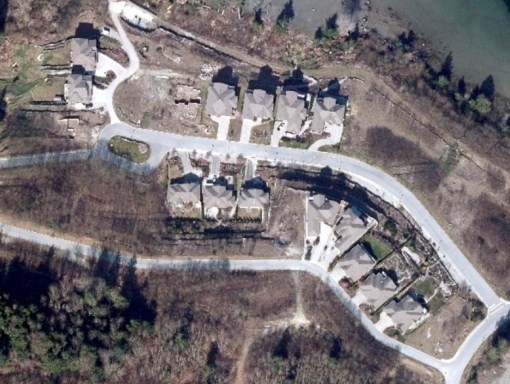The District of Sechelt and the B.C. Ministry of Public Safety have responded to a pair of lawsuits filed in July over the evacuation of the Seawatch neighbourhood.
The owners of 6637 Gale Ave. N. and 6641 Gale Ave. N. alleged the district is aware of “steps necessary to address geotechnical instability under Gale Avenue North, Seawatch Lane, Seawatch and the surrounding region” and “Sechelt’s failure to adequately implement remedial recommendations in a timely manner caused and contributed to the plaintiffs’ damage.”
The suits alleged that “Sechelt continues to refuse to implement their professionals’ recommendations despite knowing that the recommendations would substantially rectify the problems with the geotechnical instability.”
The lawsuits also argued that “the defendants’ ongoing practice of temporarily extending a purported emergency on a weekly basis by means of the evacuation order and extension orders is without lawful authority, is improper and is abusive” and has caused the homeowners “significant mental stress and anguish” as well as “costs and expenditures for shelter, clothing and furniture.”
In their response, lawyers for the District of Sechelt flatly deny the claims and argue that the homeowners have not “suffered any loss or damage or emotional pain and suffering as a result of the acts or omissions of Sechelt as alleged or at all,” and that the district “did not design, construct or install any of the roads, utilities, or appurtenant works in the subdivision.”
The district also contends that “if the plaintiffs have suffered any loss or damage or emotional pain and suffering, which is not admitted but is denied, then such loss or damage or emotional pain and suffering was the result of the plaintiffs’ own negligence in failing to take appropriate care when they knew or ought to have known that the property or the subdivision was at risk of developing sinkholes.”
The response said the District of Sechelt is not liable because the property was subject to a 2006 covenant that includes a report from the engineering firm Geotactics that “includes a description of the geotechnical aspects of the lands, including documentation of the sinkholes that had developed on the subdivision lands up to that point in time” and “an indemnity in favour of Sechelt from and against any losses arising from or in connection with, inter alia, the use of the property.”
Sechelt’s lawyers also argued that the decision to declare a state of emergency “is a statutory decision which should have been challenged by way of a judicial review” and characterizes the lawsuits as “a collateral attack on Sechelt’s statutory authority under the Emergency Program Act.”
The province’s legal team makes similar arguments in a response that also denies all claims made by the property owners.
“If the plaintiffs suffered the alleged or any injuries, loss or damage, which is denied, they failed or refused to take any reasonable steps to mitigate the same.”
The province’s response also says the minister’s decisions to approve and extend the state of emergency “is reasonable and consistent” with the Emergency Program Act and that “all decisions or actions of the province were in accordance with provincial policy standards” and not open to challenge in the courts.
A hearing date for the lawsuits has not been set.
The District of Sechelt and the province are also named as defendants in lawsuits filed by eight other Seawatch property owners on Aug. 13, which name others including the developer Concordia Seawatch, realtors, and engineers. No statements of defence have been filed in those lawsuits.
Suits filed in 2015 by the owners of a home that had to be evacuated earlier that year and a neighbouring property are expected to go to court in 2020.



